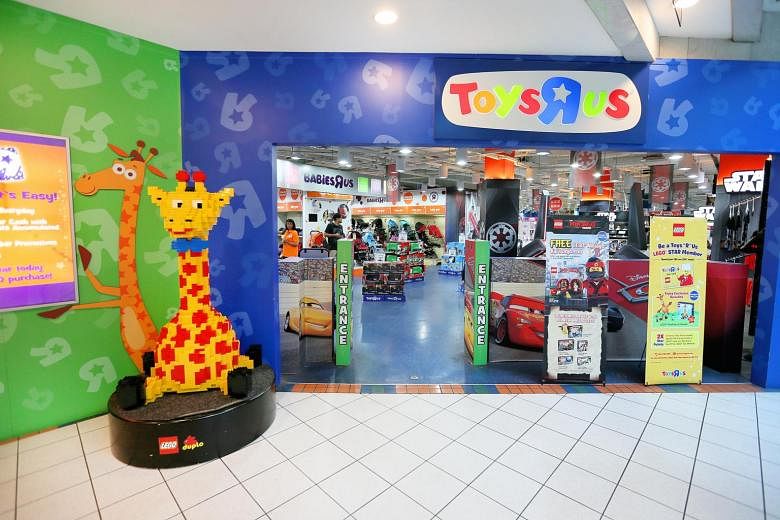The North American bankruptcy filing last Monday by Toys 'R' Us Inc, the largest toy chain in the United States, has raised questions on the impact of online shopping on traditional toy stores.
There are also jitters that video games, such as those on smartphones, are keeping children from playing with physical toys such as building blocks.
But many retail experts and stores said toy sales in Singapore are resilient, and parents will still snap up new action figures or dolls for their children at physical shops.
Video games, however, could pose a challenge.
"Only a small portion of sales of traditional toys and games in Singapore are... in online stores, while the majority of purchases still go through bricks-and-mortar stores," said Mr Tan Jun Huang, an analyst at research firm Euromonitor International.
"Toys 'R' Us in Singapore is relatively safe from shifts towards online retailing."
However, he said, the retailer has to consider investing more in its online store before it is too late.
"Online retailers are offering huge discounts and a wider variety of toys and games, especially for larger categories like construction toys and action figures," said Mr Tan.
Toys 'R' Us Inc filed for bankruptcy protection in the US and Canada to restructure long-term debts of over US$5 billion (S$6.7 billion). The company, which has 64,000 employees, has given the assurance that its 1,600 stores globally will remain open. In Singapore, it has 11 stores with 350 employees.
The Singapore business has also expanded with three new stores opening in the past eight months, which suggests the retailer is doing well here, analysts said.
The retailer said it also has " plans to further expand" here and "is looking to hire an additional 150 for the Christmas season".
For some parents, bricks-and-mortar toy shops are still relevant.
Administrative officer Natalie Lee, 42, said she is not in the habit of shopping online and still shops at Toys 'R' Us for toys for her three children aged six to 12.
"I need to try out the toy before I buy it. I want to test it, touch it and know its quality," she said.
Mr Francis Chew, the sales manager at Sheng Tai Toys, which distributes toys to retailers such as Isetan, Kiddy Palace and NTUC FairPrice, said many still prefer the interactive nature of physical shops.
This is why demand for toys in shops here "has been very consistent", he said.
Another toy retailer and a major department store also told The Straits Times that toy sales have been stable.
Mr Chew added that, instead of turning to online platforms, more areas in shops for children to try out toys might be a better idea.
Children, too, want to trot down to toy stores because of the excitement and joy they can get from doing so, said Ms Sarah Lim, a senior lecturer at Singapore Polytechnic's business school. She added that touching and feeling toys are important to them.
Still, online shopping has hurt some shops.
Ms Susan Tay, director of The Better Toy Store, said its Tanglin Mall outlet has seen a 20 per cent drop in business over the past three years.
She attributes this partly to fewer expatriates with children going there, as well as the "rise of online grocery stores that have negated the need to visit the mall for groceries".
Sales were initially affected by online websites selling toys at bargain prices several years ago, but this is no longer a problem after the online prices became stable, she said.
The Better Toy Store also enjoyed some success selling toys online, but Ms Tay said its physical stores remain the "cornerstone" of sales. In physical stores, staff give shoppers advice and open up games to allow people to try them out.
Another challenge is video games, such as those for smartphones, home consoles and computers. Video game sales here hit US$357.5 million last year, up 3 per cent from 2015, said Euromonitor, and are projected to rise 3.5 per cent to US$370.1 million this year.
This already eclipses sales of traditional toys and games, which stood at US$202.5 million last year, up by 1.1 per cent from 2015. The figure is expected to increase by 3.2 per cent to US$209 million this year.
Ms Lim said the rise in the number of smartphone and online games means children and teenagers no longer play board games and traditional toys as much.
Mr Chew said more boys, specifically, are getting into video games, which has resulted in slower sales of toys for them.
• Additional reporting by Clara Chong


